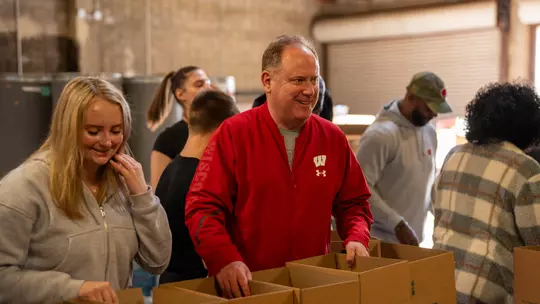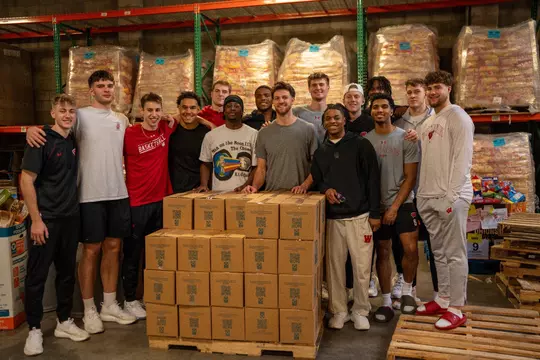
Impact of Badger Built felt here and beyond
Andy Baggot, UWBadgers.com Insider
2/27/2025
Wquinton Smith took a quiet, but impactful route to his place as a Wisconsin men’s basketball alum.
It began with the former Milwaukee King High School point guard making the Badgers as a walk-on after going through an open tryout as a freshman in 2007.
It continued through 44 games played over four seasons, including 26 outings as a senior and one start en route to him becoming a four-time letterwinner.
It concluded with Smith earning a degree in African-American Studies in 2011. He’s currently working on his doctorate in that discipline while serving as the associate director of engagement and community outreach for UW Athletics.
One of Smith’s fondest recollections from his time as a student-athlete in Madison came when he and his teammates took part in community service activities as part of Badgers Give Back program. It could have been a visit to UW Children’s Hospital. It could have involved reading books to local school kids. It could have meant working a shift at a local food pantry. It could have been volunteering to coach teams of special-needs children.
“We got to see each other in a different light and you bring out the passions in one another,” Smith said. “It shows the work that we do can be a conduit for good.”
These days, Smith works on behalf of Badgers Give Back and the recently created Badger Built. The former is all about civic involvement, camaraderie, selflessness and volunteerism. The other is a comprehensive approach to personal development, where the full life cycle of a UW student-athlete – before, during and after their time at Wisconsin – is used to create a blue print for their future.
Smith was recently reminded of the impact of both Badgers Give Back and Badger Built can have on the world beyond Madison. It began with a meeting at the Kohl Center in November of 2024 when members of the UW men’s basketball staff gathered to plan out a six-day trip to Los Angeles during semester break. Wisconsin would face Southern California on Jan. 18 and UCLA on Jan. 21. That time between Big Ten Conference games offered some time to do something selfless.
“We were discussing potential opportunities for our student-athletes,” Smith said. “Could we read to a school? Could we make a meal for people who suffer from homelessness?”
Smith landed on the Westside Food Bank in part because its community engagement manager, Shaun Dyer, said he could use the help. He said he’d tried reaching out to USC and UCLA, but hadn’t had any luck.
Dyer surprised Smith by asking if the UW entourage if they could make it on Martin Luther King Day on Jan. 20.
“Our schedule’s kind of packed that day with practice and other things,” Smith recalled of their conversation, “but he said he’d open up the facility just for us, just tell him the time (of arrival).”
UW players and coaches came directly from practice and jumped right in, as did those from the family of sophomore guard John Blackwell and junior forward Xavier Amos.
“The energy was high,” Smith said. “There was no one slacking, I can tell you that much.”
Members of the Wisconsin entourage formed an assembly line with pallets of food that had to be unpacked, then repacked in boxes and put back on pallets to be shipped out to area recipients.
“They helped immensely,” Dyer said. “It was one of those projects where it takes time to do. The group that came in got to it.”
“They asked us to do 200 packages,” Smith noted, “and we did 350.”
Jillian Blackwell, John’s mother, was joined by her mother, Joyce Baker, her son Mack and his friend, Maddie DeGrave.
“I’m always looking to see how we can help,” Jillian said. “My son is a Badger, so I’m a Badger. So, whatever the Badgers are doing we want to make sure that we’re not sitting on the bleachers, that we’re actually helping the community.”
Mind you, this whole experience was arranged three months prior to UW touching down on the West Coast to face two of the newest members of the Big Ten. So, no one knew at the time that the area was about to be ravaged by wildfires fueled by exceptionally dry conditions and unusually powerful winds. From Jan. 7 to Jan. 31, at least 29 people died, 16,251 structures were destroyed and 57,665 acres burned.
Dyer said he and his family evacuated their home in the Palisades fire, where nearly 24,000 acres burned, but while their home wasn’t damaged, he said several of his food agencies – like multiple churches and a YMCA – were destroyed.
“We were right on the border,” Dyer said.
There were concerns on the Wisconsin side, too.
“We weren’t sure it was going to happen because we thought we may have to move the game to (an arena) an hour east of LA and may have to change hotels,” Smith said.
“When we got there, I think that’s when it really set in for our student-athletes. We’d heard about the devastation of the fires. They didn’t see the damage because the streets were closed off, but after the conversation that we had with the food bank, that’s when it really set in and you could tell, ‘OK, this is something really impactful and something I’ll remember forever.’”
The families were touched as well.
“You hear about fires all the time, the families that are displaced regardless of economic status they’re in, they’re still a family that’s been displaced, their school’s been damaged and their regular routine has been disrupted,” Jillian Blackwell said.
“So, I can imagine with me and my three boys and my husband having to uproot and to know there are other people taking time out of their day-to-day – let alone people who don’t live in that state – I just believe that if there’s a hand that needs to be stretched out, it’s our responsibility to do it. It was easy for us to do.”
Smith took great joy in seeing the Blackwell and Amos families share in the experience knowing how it was impacted by his time as a student-athlete at UW.
“That was an opportunity to involve them and show them the great work we do at Wisconsin,” he said.
“I think about the times that I was a student-athlete, how some of my best memories were doing community service with my fellow teammates. We got to see each other in a different light and you bring out passions in one another. To be able to do that for this group of kids – who are great individuals, period – it really was a full-circle moment for me.”
Community building + Shared Experience = Common Ground
— Wisconsin Basketball (@BadgerMBB) January 21, 2025
Honored to give back to the LA community at the Westside Food Bank during our trip. Finding a way to come together and help is our way of celebrating the legacy of Dr. Martin Luther King, Jr.
?? - https://t.co/C9BrG3WRU5 pic.twitter.com/KGcDgsgu1t
We were grateful to have @BadgerMBB volunteer with us this week! The Badgers prepared more than 350 boxes for our neighbors in need. Their volunteer service could not come at a more critical time for our community. Thank you for your hard work ?? pic.twitter.com/rErSfsmGzX
— Westside Food Bank (@WsideFoodBank) January 25, 2025
Smith said that so many student-athletes “just don’t understand the impact that they have.” In many ways, the Badger Built program is designed to remedy that.
“As the world of college athletics evolves, we’ve noticed that we need to evolve,” said Jackie Davenport, the UW associate athletic director for student services. “Either we are proactive and thoughtful about changing or the world changes around us and we have to react to that.
“So, the reason we created Badger Built was to adjust, to look at where we need to go and to be nimble enough to adjust to the changing landscape of college athletics.
“We’re taking a student-centered approach to it and looking at it from the uniqueness of the student’s perspective and what they need instead of the traditional, ‘This is what you’re getting and you just have to do it.’ It’s looking at the student and where their needs are and saying ‘What do you need to develop personally?’ If you want to be here for a year, we’ll help develop you so that when you leave here, we’re preparing you to win now and beyond. So, when you leave here – if you’re here for a year or four years or five – we’re going to prepare you so that you’re successful now and when you leave.
“The world our student-athletes live in is individualized and customized to them. You get to watch what you want to on Netflix. You don’t have to watch the four basic channels (most adults) grew up watching. You get to choose what you want to watch.
“That’s the same for student-athletes,” Davenport continued. “They get to choose everything and everything is customizable to them. The reason we put together Badger Built was that it’s customizable to the student-athlete for the student-athlete. They get to create their own developmental plan to help them get to where they want to be.”
The Badger Built brand came to life 13 months ago. “We went through the dimensions of wellness and got feedback in the fall of ’23 and launched Badger Built to staff and rolled it out to student-athletes in January of ’24,” Davenport said.
There are a host of ways to measure the effectiveness of Badger Built as defined by five units: academics and career, alumni relations, engagement and community outreach, leadership and inclusion and student-athlete development.
According to the first Badger Built impact report from the fall of 2024, there were 390-plus visits to American Family Children’s Hospital, a department term grade point average of 3.319 and a department cumulative GPA of 3.321.
There were 30 degrees awarded in the fall of 2024, 139 majors studied, 22 leadership developments offerings, 90-plus athletes networked with professionals, and 46 employers that provided opportunities to student-athletes.
“Anytime you can provide resources to student-athletes to help them succeed, whether it’s in school or in the future, I think that’s paramount because obviously you want them to have success while they’re here, but, more importantly, you’re preparing them for life after school and sports,” said Owen Lindmark, captain of the UW men’s hockey team who touted a financial literacy program.
“Badger Built gives us knowledge about what we’re going to face in the outside world.”


